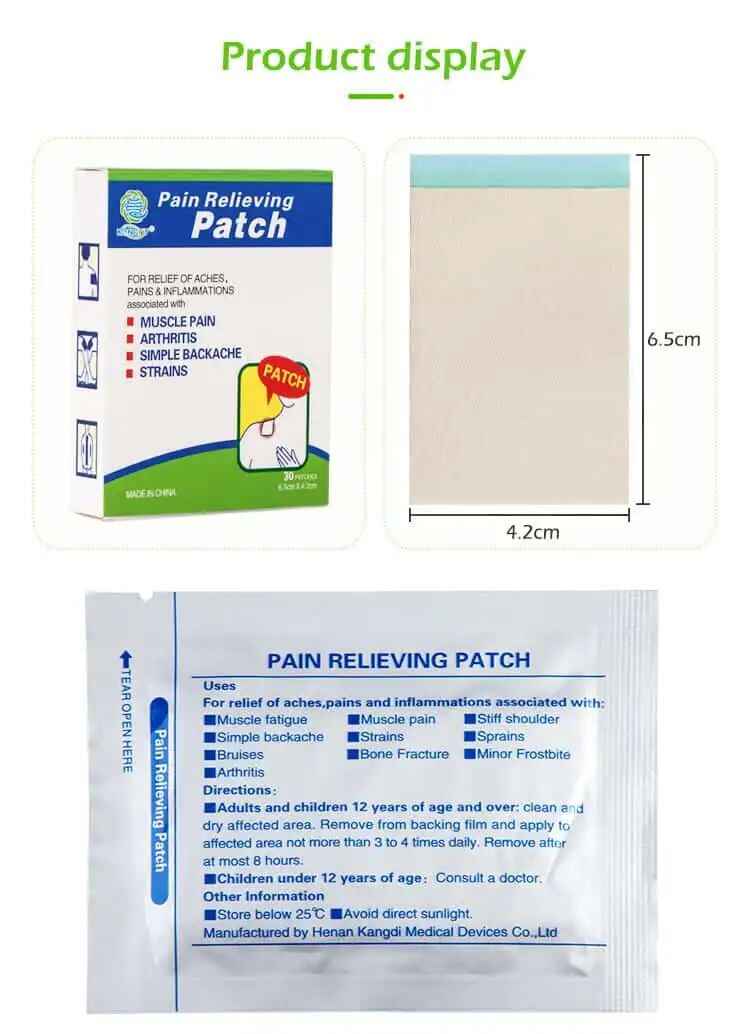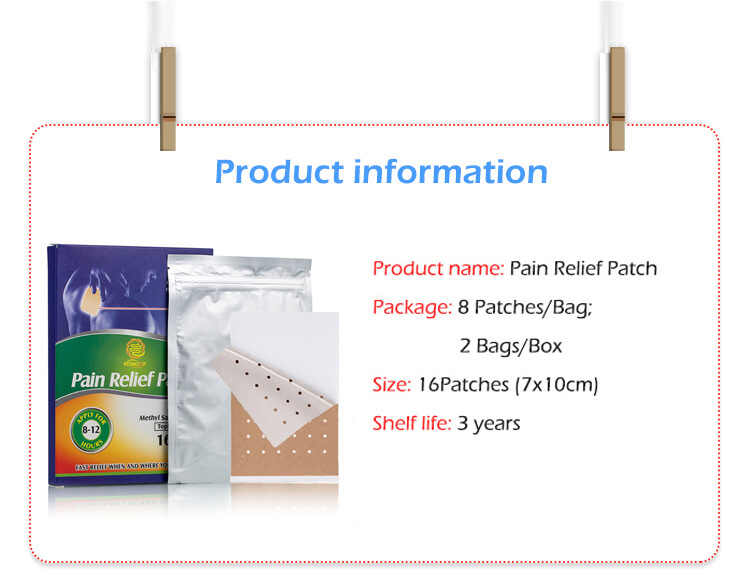How Sports Pain Patches OEM Ensures Product Safety and Compliance
Protecting Your Brand with Reliable Manufacturing and Regulatory Practices
In the competitive sports and wellness market, product safety and regulatory compliance are non-negotiable—especially for businesses sourcing from Sports Pain Patches OEM suppliers. Whether you're developing Custom Sports Pain Patches or launching a new line of Private Label Sports Pain Patches, working with a trusted Sports Pain Patches Manufacturer ensures your products meet safety standards and legal requirements in global markets.
This in-depth guide breaks down how top-tier Sports Pain Patches OEM partners implement safety measures and maintain compliance from formulation to packaging. It also helps B2B clients understand what to expect from a professional Sports Pain Patches Supplier, and what questions to ask during the selection process.

1. Why Product Safety and Compliance Matter in OEM Sports Pain Patches
In the B2B space, your product’s safety directly impacts your reputation, market access, and profitability. Deficiencies in compliance can result in:
Product recalls
Regulatory fines
Customer injury or irritation
Legal liabilities
Brand damage and lost trust
Choosing an OEM that has strong safety protocols and proven compliance systems reduces your risk significantly and supports long-term brand credibility.
2. Understanding Safety in Sports Pain Patches OEM Manufacturing
What Does “Product Safety” Mean for Sports Pain Patches?
In the context of Sports Pain Patches Manufacturer operations, safety includes:
Use of non-toxic, skin-safe ingredients
Proper dosage of active compounds like menthol or capsaicin
Hypoallergenic adhesives and fabrics
Microbial and heavy metal contamination prevention
Compliance with skin irritation and sensitization testing
Top Sports Pain Patches Suppliers follow Good Manufacturing Practices (GMP) and perform multiple safety-related quality checks throughout the production process.
3. How Compliance Is Achieved in Sports Pain Patches OEM
Compliance refers to the ability of your product to meet legal and regulatory requirements in your target market, whether that’s the United States, the EU, Canada, or elsewhere.
A reputable Sports Pain Patches OEM ensures compliance through:
Ingredient approval and documentation (e.g., INCI, MSDS)
Packaging compliance (e.g., labeling, claims, expiration dates)
Product classification support (medical device vs. cosmetic)
Adherence to local regulatory standards (FDA, CE, TGA, etc.)
Batch testing and Certificates of Analysis (CoA)
This is especially important for Private Label Sports Pain Patches, where your brand name appears on the packaging and liability can rest on your company.
4. Key Safety and Compliance Measures in OEM Production
Let’s examine the six pillars that leading Sports Pain Patches Manufacturers implement to guarantee product safety and regulatory compliance:
1. Ingredient Sourcing and Validation
The safety journey begins with raw material sourcing. High-quality Sports Pain Patches OEM suppliers ensure that all ingredients:
Are approved by regulatory authorities
Come with Certificates of Analysis (CoA)
Are tested for microbiological and heavy metal contaminants
Are hypoallergenic and dermatologically safe
Ingredients used in Custom Sports Pain Patches often include natural plant extracts (e.g., camphor, arnica) or synthetics (e.g., lidocaine). Every compound must be validated for safety and effectiveness.
2. GMP-Compliant Manufacturing Processes
Good Manufacturing Practices (GMP) ensure that patches are produced under hygienic and controlled conditions. A qualified Sports Pain Patches Manufacturer will have:
Controlled cleanroom environments
Equipment calibration logs
Standard operating procedures (SOPs)
Personnel hygiene protocols
In-process quality control (IPQC) checkpoints
These prevent contamination and ensure consistency, especially critical in Private Label Sports Pain Patches that go directly to market.
3. Patch Stability and Safety Testing
OEM suppliers perform multiple tests to ensure patch safety, including:
Skin irritation and sensitization tests
Stability tests (under varying temperatures and humidity)
Adhesive strength and residue testing
Patch integrity tests to check for defects
Some Sports Pain Patches OEM partners even offer accelerated shelf-life testing to simulate real-world storage conditions.
4. Packaging and Labeling Compliance
Packaging is not just for branding—it’s also a legal tool. Your Sports Pain Patches Supplier must ensure that packaging:
Lists all active and inactive ingredients clearly
Follows local language and regulation formats
Contains appropriate usage instructions and warnings
Includes batch numbers, expiration dates, and storage guidelines
For Custom Sports Pain Patches, this may also include claim substantiation (“lasts up to 8 hours,” “fast-acting relief”) that must be supported by test data.
5. Regulatory Certification Support
If you are planning to sell your Private Label Sports Pain Patches internationally, choose an OEM that supports regulatory filings such as:
FDA Drug or Device Registration (USA)
CE Marking (Europe)
TGA Listing (Australia)
CFDA Filing (China)
Health Canada Notifications
OEMs with in-house regulatory experts or third-party partners can guide you through the compliance process, saving you time and avoiding costly errors.
6. Documentation and Traceability
Your Sports Pain Patches Manufacturer should offer complete transparency, including:
Full batch manufacturing records
Ingredient traceability
Testing reports for each production lot
Certificates of Free Sale and MSDS documentation
These documents are essential for market audits and certifications, particularly for large-scale distributors or pharmacy retailers.
5. Safety and Compliance in Custom and Private Label Sports Pain Patches
Customization increases the complexity of compliance. For Custom Sports Pain Patches, your OEM partner must ensure:
Custom formulas use compliant and approved ingredients
New actives or herbal combinations pass safety tests
Unique patch designs meet durability and skin tolerance standards
For Private Label Sports Pain Patches, the OEM must ensure your branding, claims, and packaging comply with all labeling laws and consumer protection guidelines.
6. What B2B Clients Should Expect from a Compliant Sports Pain Patches OEM
Before choosing an OEM partner, B2B clients should evaluate:
✅ Does the OEM hold GMP, ISO, or FDA certifications?
✅ Can they provide documentation for safety testing and compliance?
✅ Do they offer regulatory support for your target markets?
✅ Is their manufacturing process traceable and transparent?
✅ Are they experienced in producing compliant Private Label Sports Pain Patches?
A top-tier Sports Pain Patches Supplier should function as an extension of your quality and regulatory team—not just a contract manufacturer.
7. How Safety and Compliance Build Brand Trust
When your Custom Sports Pain Patches consistently meet safety and legal standards:
Retailers are more willing to stock your products
Consumers feel confident in using your patches
Regulatory hurdles are minimized during expansion
Your brand image is associated with quality and care
In a saturated market, safety and compliance become powerful differentiators.
Frequently Asked Questions (FAQ)
1. What regulations apply to Sports Pain Patches in the U.S.?
They may be classified as OTC drugs or medical devices, and must comply with FDA labeling, manufacturing, and ingredient standards.
2. How can I be sure my Private Label Sports Pain Patches are compliant?
Work with a certified Sports Pain Patches OEM that provides all relevant documentation and supports regulatory approval processes.
3. Are natural ingredients always safe in Custom Sports Pain Patches?
Not necessarily. Natural ingredients must still be tested for allergens, contaminants, and interactions. Safety comes from testing, not origin.
4. Do I need separate testing for international markets?
Yes, safety standards differ by country. A global Sports Pain Patches Supplier should help you meet each market's requirements.
5. How often should I audit my Sports Pain Patches Manufacturer?
Conduct audits annually or when major changes occur in production, regulation, or product formulation.
Final Thoughts
Safety and compliance are more than regulatory checkboxes—they are essential business imperatives that protect your brand, your customers, and your future. Whether you’re launching Custom Sports Pain Patches or scaling your Private Label Sports Pain Patches internationally, the right Sports Pain Patches OEM will prioritize every safety and legal detail.
By partnering with a certified and experienced Sports Pain Patches Manufacturer, B2B clients can confidently bring effective, compliant, and safe pain relief products to the global market.
Would you like a checklist to help evaluate the compliance standards of your current or future Sports Pain Patches Supplier?






